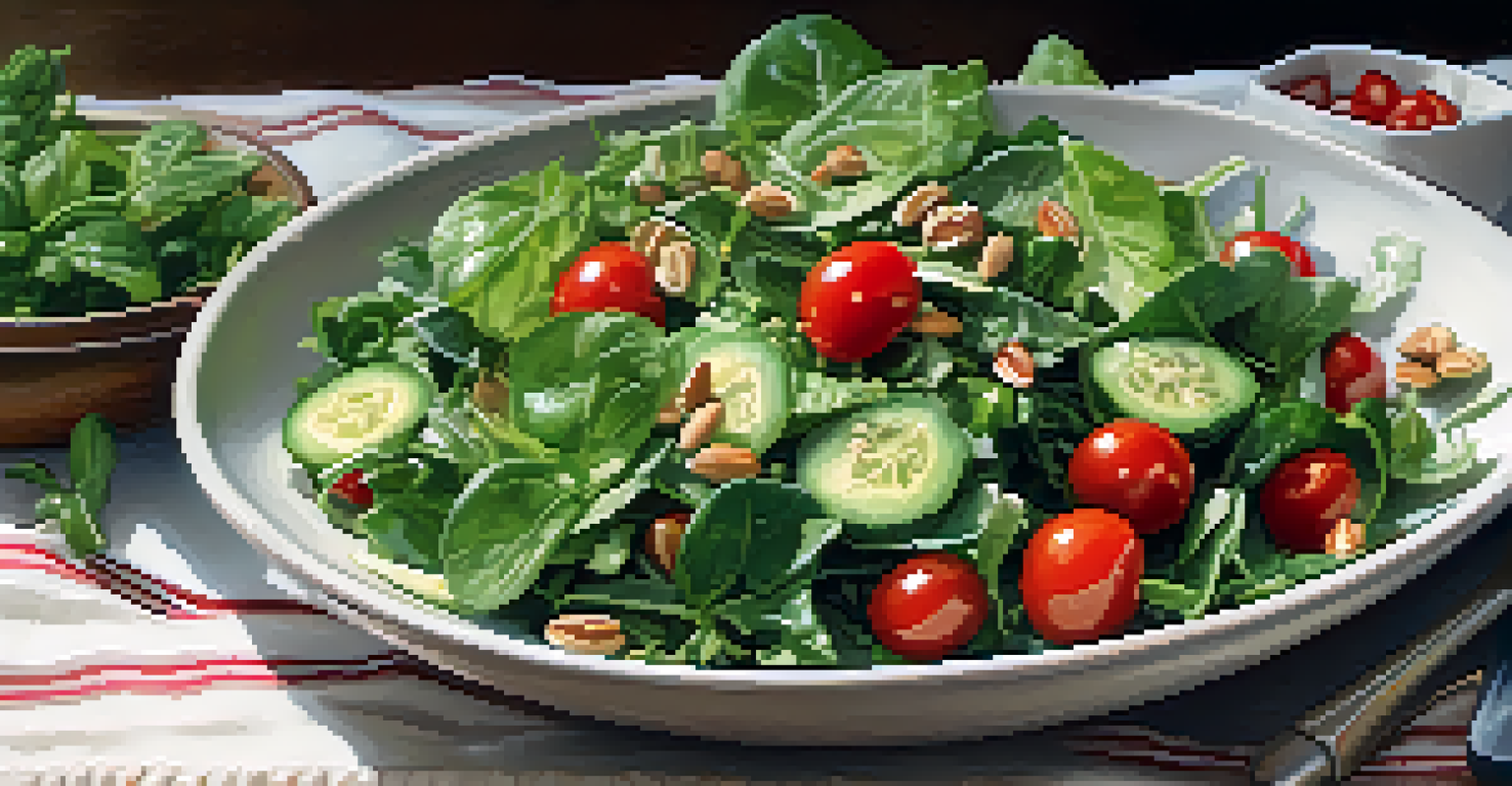Vegan Foods for Heart Health: Natural Remedies Explained

Understanding Heart Health and Vegan Diets
Heart health is a crucial aspect of overall well-being, and diet plays a significant role. A vegan diet, rich in fruits, vegetables, and whole grains, can be particularly beneficial for heart health. By avoiding saturated fats found in animal products, vegans often lower their cholesterol levels and reduce the risk of heart disease.
Let food be thy medicine and medicine be thy food.
Moreover, plant-based foods are packed with antioxidants and fiber, which help combat inflammation and improve blood circulation. This powerful combination not only supports heart health but also boosts overall vitality. Think of it as choosing a vibrant garden over a barren landscape; a colorful plate gives your heart the nutrients it craves.
As we explore various vegan foods, we'll uncover how they can serve as natural remedies for maintaining a healthy heart. It's all about making informed choices that nourish your body and promote longevity.
Fruits: Nature's Sweetheart for Heart Health
Fruits are not just delicious; they are also packed with vitamins and minerals essential for heart health. Berries, for example, are rich in antioxidants called flavonoids, which have been shown to lower blood pressure and improve vascular function. A bowl of mixed berries can be a sweet treat that comes with heart-healthy benefits.

Citrus fruits, like oranges and grapefruits, are also fantastic choices. They contain high levels of vitamin C and fiber, both of which contribute to reducing cholesterol levels. Imagine starting your day with a refreshing citrus smoothie; it's a simple way to give your heart a boost.
Vegan Diet Benefits Heart Health
A vegan diet, rich in fruits, vegetables, and whole grains, can lower cholesterol and reduce the risk of heart disease.
Incorporating a variety of fruits into your diet not only enhances flavor but also provides a diverse range of nutrients. So, when you're looking for a snack or dessert, reach for the fruit bowl instead of processed options for a heart-healthy choice.
Leafy Greens: The Powerhouses of Nutrition
Leafy greens, such as spinach, kale, and collard greens, are often referred to as 'superfoods' for a reason. They are low in calories yet high in essential nutrients like potassium, which helps regulate blood pressure. Including these greens in your meals can be as simple as adding them to smoothies, salads, or stir-fries.
You are what you eat, so don’t be fast, cheap, easy, or fake.
These vegetables are also loaded with antioxidants that combat oxidative stress, a key factor in heart disease. Picture a vibrant salad topped with a variety of greens; not only is it visually appealing, but it also delivers a powerhouse of nutrients to your body.
Furthermore, the fiber content in leafy greens aids in digestion and keeps cholesterol levels in check. By making leafy greens a staple in your diet, you're investing in your heart's long-term health.
Whole Grains: Fueling Your Heart with Fiber
Whole grains are an excellent source of dietary fiber, which is essential for heart health. Foods like quinoa, brown rice, and oats help lower cholesterol levels and maintain stable blood sugar levels. When you choose whole grains over refined grains, you're opting for a heart-friendly option that keeps you feeling full longer.
Incorporating whole grains into your meals can be simple and delicious. For instance, swapping white rice for brown rice in your favorite dishes not only adds flavor but also provides more nutrients. It's these small changes that can have a profound impact on your heart health.
Incorporate Diverse Plant Foods
Including a variety of fruits, leafy greens, whole grains, nuts, seeds, and legumes in your diet enhances flavor and provides essential nutrients for heart health.
Additionally, whole grains are rich in essential vitamins and minerals, such as magnesium and B vitamins, which support various bodily functions. Embracing whole grains as a core part of your diet can provide lasting benefits for your heart.
Nuts and Seeds: Small but Mighty Heart Helpers
Nuts and seeds are small powerhouses of nutrition that can significantly benefit your heart. Almonds, walnuts, chia seeds, and flaxseeds are packed with healthy fats, fiber, and protein, all of which contribute to heart health. Just a handful of nuts can provide a satisfying snack that keeps your heart in check.
These foods contain omega-3 fatty acids, known for their anti-inflammatory properties. This means they help reduce the risk of heart disease by lowering triglyceride levels and improving overall heart function. Picture yourself enjoying a sprinkle of chia seeds on your smoothie bowl; it's a tasty way to boost your heart health.
Moreover, incorporating a variety of nuts and seeds into your diet can enhance flavor and texture in your meals. By making these nutrient-dense foods a regular part of your diet, you're taking a proactive approach to maintaining a healthy heart.
Legumes: Heart-Healthy Protein Powerhouses
Legumes, such as beans, lentils, and chickpeas, are fantastic sources of plant-based protein that can support heart health. They are rich in fiber and low in fat, making them an ideal choice for a heart-healthy diet. Imagine a hearty lentil soup; not only is it comforting, but it also provides essential nutrients for your heart.
Adding legumes to your meals can help lower cholesterol levels and stabilize blood sugar. They also promote a feeling of fullness, which can aid in weight management—another key aspect of heart health. It's easy to incorporate legumes into salads, stews, and even burgers for a nutritious boost.
Herbs and Spices Boost Heart Care
Using herbs and spices like garlic, turmeric, and ginger not only adds flavor but also supports cardiovascular health through their anti-inflammatory properties.
The variety of flavors and textures that legumes offer means you can enjoy them in countless ways. By making legumes a staple in your diet, you're not just feeding your body; you're nurturing your heart.
Herbs and Spices: Flavorful Allies for Heart Health
Herbs and spices are often overlooked, but they can play a significant role in promoting heart health. Ingredients like garlic, turmeric, and ginger are known for their anti-inflammatory and antioxidant properties. Adding these flavorful spices to your meals not only enhances taste but also supports cardiovascular health.
Garlic, in particular, has been linked to lower blood pressure and improved cholesterol levels. Think of how easily you can toss some minced garlic into a stir-fry or pasta dish for a burst of flavor and health benefits. It's a simple yet effective way to season your food while caring for your heart.

Incorporating a range of herbs and spices into your cooking can elevate your dishes and boost your heart health. So next time you're in the kitchen, don’t shy away from experimenting with these natural remedies.
Creating a Heart-Healthy Vegan Meal Plan
Now that we've explored various vegan foods that support heart health, it's time to think about how to create a meal plan that incorporates these ingredients. Start by including a variety of fruits, vegetables, whole grains, nuts, seeds, and legumes in your daily diet. This diversity not only provides nutritional benefits but also keeps meals exciting and satisfying.
Planning meals around seasonal produce can help you enjoy fresh, nutrient-rich foods while supporting local farmers. Consider preparing a weekly menu that features a colorful array of dishes, such as grain bowls topped with roasted veggies and legumes or vibrant salads filled with leafy greens and nuts.
Lastly, remember that moderation is key. While these foods are beneficial, balance and variety are essential for a well-rounded diet. By creating a heart-healthy vegan meal plan, you're taking proactive steps toward a healthier lifestyle and a happier heart.